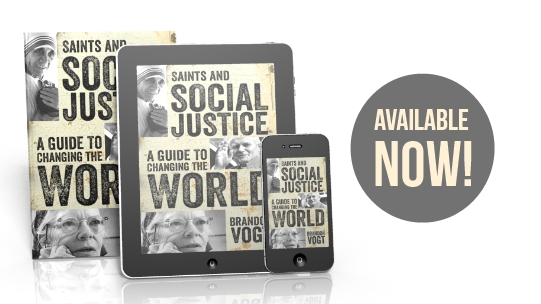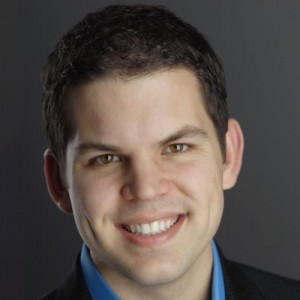
All it takes to sustain a culture war is a few select voices shouting in ideological indignation and people who are willing to label themselves “left” or “right” and then fall in line. In the 21st Century, this uncompromising mindset is creating economic and political stagnation and a socio-political distrust that is destroying us.
It doesn’t have to be this way. With Saints and Social Justice: A Guide to Changing the World, author Brandon Vogt dares to suggest that our world might be saved from its “either/or” self by the non-ideological “both/and” that has always been Catholic social teaching. Intent on bringing those dread words “social justice” into the light and rescuing them from rhetorical misuse, Vogt ties the disparate lives and works of 14 Catholics of heroic charity to the 14 works of Spiritual and Corporeal Mercy to illustrate just how completely our perceived “sides” and ideologies disappear when issues of life, family, rights, poverty and human dignity are addressed through the Christ-centered lenses of justice and mercy.
Asking God to change the world necessitates first our individual willingness to be conformed to God’s own plans and desires.
Here Vogt kindly answers a few questions on precisely these thoughts in an interview with me, as the Patheos Book Club looks at his book.
Elizabeth Scalia: Glenn Beck famously said to his listeners: “Look for the words ‘social justice’ or ‘economic justice’ on your church website. If you find it, run as fast as you can.” Did the politicization of those words — particularly as they apply to Catholic Social Teaching — have anything to do with your writing this book?
Brandon Vogt: Definitely. Beck gave voice to an intuition many people share, and it did serve as an impetus for my book. Yet, as I note in the Introduction, I don’t fault Glenn Beck. I get where he’s coming from. It’s true that “social justice” and “economic justice” have been twisted, misunderstood, and co-opted for troubling purposes. Most of us are aware of that. But as the ancient dictum goes, abusus non tollit usum (abuse does not preclude proper use).
Just because people have distorted the words, or the concepts behind them, we shouldn’t avoid them. Rather, we should clarify and redeem them.
The fact that these terms are politicized shouldn’t worry us, either. Catholic social teaching is political. It deals extensively with governments, social relationships, and structures of power. Yet while political, it’s not partisan. It transcends any party, ideology, or political grid. That’s why it’s Catholic social teaching and not Republican/Democrat social teaching.
ES: How do you think the phrase “Social Justice” has been distorted since the Second Vatican Council and an era of still-reverberating social upheaval?
BV: To put it simply, many people have reduced the Gospel to social justice. After the Council, Catholics tended to downplay practices like apologetics, evangelization, and missionary work in favor of “making the world a better place.” We were convinced that feeding the hungry and serving the poor would win people to Christ. Now that sometimes happens, but that’s not the fullest expression of the Gospel. People are saved by Jesus Christ, not works of justice. When “social justice” becomes code for helping people without evangelizing, we have problems, and that’s what worries many people today.
Also, the phrase became sullied as liberation theology took off in Central America around the time of the Council. Many proponents used “social justice” as a cloak to smuggle Marxist ideology into the Christian faith, often leading to warped theology and violent rebellion. This has led many to associate “social justice” with communistic, socialist, or politically aggressive ideologies.
But again, while it’s true that some people use the phrase this way, it’s not how the Church has used it for hundreds of years. We can’t eschew it just because some circles have abused it. We need to reclaim it, clarify it, and redeem it as we build a culture of authentic social justice.
ES: In setting out to help define Catholic Social Teaching, why did you decide to bring saints into it?
BV: Because the saints embody all teachings of Christ and his Church, especially the social teaching. Catholic social teaching can often be abstract and ethereal. But the saints give it bones. They show these teachings authentically lived, providing example for us those hoping to live it today.
ES: We don’t talk much anymore about Spiritual Works of mercy, Corporal Works of Mercy, and yet for the saints — particularly those you include in the book — it’s not an either/or proposition, but a both/and. Can you talk about how they practiced both the spiritual and the corporeal, and how that works in a busy life?
BV: This was a main thread I discovered among all the saints I researched, namely that they didn’t see the corporal works of mercy (feeding the hungry, clothing the naked, burying the dead, etc.) and the spiritual works of mercy (counseling the doubtful, forgiving wrongs, praying for the living and the dead, etc.) as distinct and unrelated. Instead, they understood them as two threads of the same helix. That’s what they are for the saints: their DNA. The works of mercy are the genetic code of saintliness. Every saint knows that the spiritual works breathe life into the corporal works, and the corporal works incarnate the spiritual.
What does that mean for us? Dorothy Day once quipped, “Everything a baptized person does each day should be directly or indirectly related to the corporal and spiritual works of mercy.” These aren’t things we squeeze into a busy life, as if they were burdensome add-ons. Instead they offer ways to sanctify the things we’re already doing. For instance, we can forgive offenses willingly while driving; comfort the afflicted at work; bear wrongs patiently on Facebook; feed the hungry at home; and pray for the living and the dead before going to sleep. With a firm and creative resolve, these works can saturate everything we do.
ES: “Two threads of the same helix”, I love that. I saw a recent story about a metropolitan building that had rooted spikes into the cement to keep the homeless from using that spot as a shield from the weather. What sort of response do you think Dorothy Day might have made to that?
BV: To be a saint means to be a friend of Jesus Christ, to know him personally. This was true of Dorothy Day, Pier Giorgio Frassati, and every saint in my book. And when you know Jesus Christ, you recognize him in the poor. This is because Jesus, in Matthew 25, identified himself with the hungry, the thirsty, and the homeless. When any of these saints served the poor on earth, they were convinced they served Jesus “in his most distressing disguise”, to use Mother Teresa’s phrase. They weren’t serving Christ indirectly, through an intermediary. They were serving him directly.
Dorothy Day reiterated this, noting, “Those who cannot see Christ in the poor are atheists indeed.” A prophetic saint like her would have understood that putting spikes in the floor to keep homeless men away was to shun Christ himself.
That said, Dorothy probably would have reacted by doing exactly what she did in her day: ramping up her “houses of hospitality.” The New York of the 1930′s and ’40s in which she lived had its own share of homeless vagabonds. But instead of putting spikes in the ground, Dorothy opened up shelters and gave them a place to sleep.
ES: You mention Pier Giorgio Frassati, here and in your book you say that if you only had one saint to write about, it would be Frassati; how do you identify with him? What in his story really speaks to you?
BV: When I was 24 years old, I began searching for a young saint to connect with. I stumbled on Pier Giorgio Frassati, who was born in 1901 but died early at 24, the same age I was at the time. The more I read about him, the more I liked. Pier Giorgio was an adventurous young man who scaled mountains throughout Italy and went on long hikes. He was also politically active, protesting in the streets and championing social causes. He was smart, popular, active, and fun, and he drew many to him through his warmth and charisma.
Yet he was also an extremely devout Catholic. He attended Mass every day and wouldn’t go on a mountain climb unless there was a church nearby. He prayed the Rosary daily, sometimes five times per day, and often had deep, mystical experiences in prayer.
Complementing his spiritual life was an intense devotion to the poor. Pier Giorgio served in the streets daily and personally, visiting poor families and giving them food, money, and even the clothes off his own back. He often gave away his bus money to the poor, forcing him to run home for dinner. When he would take the train, he always rode third class. “Why?”, a friend asked. “Because there’s no fourth class,” Pier Giorgio replied.
The reason he embodies Catholic social teaching is because he fuses all its elements: faith with charity, contemplation with activism, personal care with institutional reform, and boundless joy with the grit of service. That’s why John Paul II named him “a Man of the Beatitudes.” Pier Giorgio sums up the blessed life of the Gospel.
ES: “It is good that you exist.” In his Principles of Catholic Theology: Building Stones for a Fundamental Theology, Pope Benedict wrote those words back in 1987, and he repeated them in 2011. You note that Pope Francis used those exact words in a 2013 interview with John L. Allen, Jr. We could say these six powerful words are the foundation of all Catholic Social Teaching — they underscore our teaching on life issues, capital punishment, war, human trafficking. Both popes are very insistent about this: it is good that you exist. Why might those words — that very fundamental philosophy — discomfit people?
BV: Because our culture doesn’t really believe them. To say “it is good that you exist” is to imply that central Christian truth, that all people were created good. It’s to herald the most important theme of Catholic social teaching, the life and dignity of the human person.
But while paying lip service to this truth, our culture rejects it. It suggests that it’s not good some people exist, especially if they discomfort or inconvenience us. Far too often the culture says to those with disabilities, those unborn, those in poverty, or those from other countries, “It would be better for us if you didn’t exist.”
But Christianity holds that God created the world good–and continues to do so. Every person was joyfully and intentionally made by God for a specific purpose that only he or she can fulfill. Regardless of their size, health, intelligence, beliefs, race, religion, or any other factor, it’s good that they exist.
Catholic social teaching has loudly proclaimed this truth to an increasingly misguided culture.
ES: Becoming acquainted with the holy men and women who embody the words Social Justice makes it all seem much less frightening, except of course, trying to live up to their examples. We must pray for grace, of course, but what other advice do you have for readers who wish to further explore matters of social justice and add Spiritual and Corporeal Works of Mercy into their Christian practice?
BV: Following these saints, and living the works of mercy, is not something we master all at once. As with any virtue, these are perfected slowly, and often then one at a time. I encourage readers to pick just one of the fourteen works of mercy–or just one of the saints in my book–and make that the focus of your imitation. Creatively fulfill that work in different ways throughout the week. For example, if you choose “feeding the hungry”, you might serve at a soup kitchen one night; buy a sandwich for the homeless man outside the gas station, or give him a gift card; skip one meal and donate the money to a food charity; bring some food to your local food bank. These are all small actions, but when performed with great love can produce remarkable results, both in the world and in your soul.
ES: 100% of the royalties from Saints and Social Justice: A Guide to Changing the World will be donated to Catholic Charities USA to feed and clothe those in need. You’re putting your money where your mouth is. Not to embarrass you but can you talk about that?
BV: St. Augustine once encouraged, “Find out how much God has given you and from it take what you need; the remainder is needed by others.” I don’t need the royalties, but others do. Easy decision.
Inspiring, too. I love everything about this book, from layout to the clarity of its presentation (which is “fair and balanced” in a way people who use that phrase to excess can so seldom manage) and I am so glad the Patheos Book Club is featuring Saints and Social Justice this month. Please go there to read an excerpt, read more reviews and to watch Brandon’s lovely interview with Deborah Arca. I’ve decided to donate some copies to our parish youth group, and a few other outlets. The book deserves wide disbursement, because it really can change everything, if people take it to heart.













